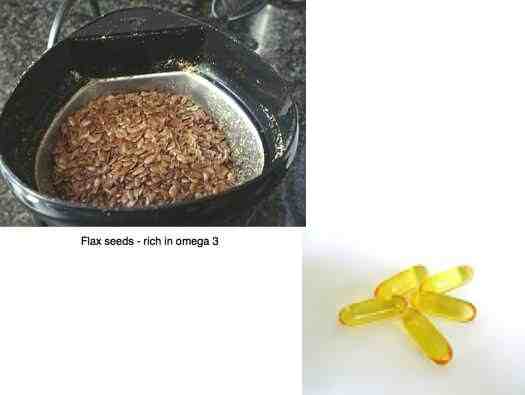Ground-flaxseed vs oil
Ground-flaxseed vs oil research throws up some new fascinating facts about cholesterol.
It is now beyond dispute that they both have a profound influence on raised cholesterol; as effective as statins but which is better, freshly-ground flaxseed or the oil?

This page was last updated by Bernard Preston on 5th June, 2023.
Flaxseeds contains at least two vital ingredients and no doubt many more that remain unresearched.
- It is the richest plant-source of omega 3. There are three of these fatty compounds; here we are talking about ALA, or alpha linolenic acid.
- But there is also a group of plant compounds called lignans; both have an effect on inflammation in blood vessels, muscles and joints but what influence do they have on the cholesterol profile?
Flaxseed oil contains none of the fibrous hull that contributes so much to the friendly flora in the gut; and even the enriched liquid has at most two percent of the lignans.
And what about the cost of freshly-ground flaxseeds vs the oil in capsules?

1. University of Bucharest – department of medicine and pharmacology.
Researchers took a group of adults with raised total cholesterol (> 240 mg/dl) and divided them into three groups:
- Food group. Received only low fat meals.
- Statin group. Received the same low fat meals + statins.
- Ground flaxseed group. The same low fat meals + 20g (just over a tablespoon) ground flaxseeds each day.
After two months, the researchers found:
- The flaxseed supplementation resulted in a 17% lower total cholesterol.
- It lowered the LDL cholesterol by 4%.
- It raised the healthy HDL cholesterol by 26%.
Perhaps more important they reported there was "no significant difference" between the statin and the flax seed groups.(1)
2. Emory University (Force trial)
Researchers took a group of obese (BMI 37 average), divided them into two groups both of which also went on the American Heart Association Step One Diet.
- 5.2 g of flax seed oil.
- 5.2 g of olive oil (Oleomed)
After six months the researchers tested both the cholesterol profiles, and the particle size of the cholesterol*.
Results:
- The flaxseed oil group had a significant increase in total cholesterol. There was no change in the olive oil group.
- The LDL, HDL, TG did not change, nor differed from one group to the other.
- Both the LDL and HDL particles increased in size in the flax seed oil group.
* Particles size. The larger LDL particles are less damaging and the bigger HDL particles are more beneficial; so there was some value.
The material expressed on this page is gleaned from the nutritional and environmental literature; it is clearly referenced. A plain distinction is made between the author's opinion and that which is scientifically proven. When in doubt consult your health professional.
To suggest a correction or clarification, write to Dr Bernard Preston here. Contact.
The known protection does not come from a change in the cholesterol profile from consuming flaxseed oil. Researchers speculate that the it is the lignans that are responsible for lowering the LDL; and not from the omega 3 fatty-acid, ALA.
It's also known that ALA is converted in the body to the other two omega 3 fatty acids, EPA and DHA. They speculate that the cardiac benefit is from these other two compounds, more usually obtained from marine-based sources.
3. University of Pennsylvania trial (J Am Coll Nutr 2008 27(1))
Raw freshly-ground flaxseed vs wheat bran added to baked products
62 persons with raised LDL were divided into two groups[3]. Both groups followed a reduced fat, low cholesterol diet.
Both groups ate two baked muffins a day, each containing either
- 20g of ground flax seed, or
- 20g of wheat bran.
(20g of ground flaxseed is a little more than a tablespoon.)
Conclusions:
- Plasma omega-6 was reduced and ω3 increased, resulting in a healthy lowering of the six/three ratio.
- At five weeks there was a significant reduction in total cholesterol and LDL in the ground flaxseed group, but...
- At ten weeks the two groups were identical. Researchers suspected that this was due to "reduced adherence" by the subjects, or biological adaptation.
- Oddly, in men there was a decrease in the healthy HDL fraction, but not in women.
- There was no loss of body weight in either group.
- Insulin sensitivity significantly improved in the flax seed group.
- Those in the flaxseed group with hypertension had an anti-inflammatory effect as measured by C reactive protein, whereas there was an increase in CRP in the wheat bran group.
Newsletter
Our newsletter is entitled "create a cyan zone" at your home, preserving both yourself and Mother Earth for future generations; and the family too, of course. We promise not to spam you with daily emails promoting various products. You may get an occasional nudge to buy one of my books.
Here are the back issues.
- Lifestyle and ideal body weight
- What are ultra-processed foods?
- Investing in long-term health
- Diseases from plastic exposure
- Intensive lifestyle management for obesity has limited value
- A world largely devoid of Parkinson's Disease
- The impact of friendly bacteria in the tum on the prevention of cancer
- There's a hole in the bucket
- Everyone is talking about weight loss drugs
- Pull the sweet tooth
- If you suffer from heartburn plant a susu
- Refined maize meal and stunting
- Should agriculture and industry get priority for water and electricity?
- Nature is calling
- Mill your own flour
- Bake your own sourdough bread
- Microplastics from our water
- Alternative types of water storage
- Wear your clothes out
- Comfort foods
- Create a bee-friendly environment
- Go to bed slightly hungry
- Keep bees
- Blue zone folk are religious
- Reduce plastic waste
- Family is important
- What can go in compost?
- Grow broad beans for longevity
- Harvest and store sunshine
- Blue zone exercise
- Harvest and store your rainwater
- Create a cyan zone at your home
My overall conclusions @ Ground flaxseed vs oil
- 20 grams of freshly ground flaxseed is as effective as taking statins, lowering total cholesterol and reducing the "bad" LDL fraction; and raising the "good" HDL.
- The overall research suggests that flaxseed oil in capsules is beneficial but the mechanism is unknown and, disturbingly actually raises total cholesterol.
- It would appear that the lignans in flaxseed are the main benefactors; there is little or none in the oil.
- Freshly-ground flaxseed, containing both ALA omega 3 and lignans is far more beneficial than the oil alone.
- A tablespoon of flaxseed is as beneficial as taking statins; with none of the nasty side effects.
- The benefit of ground flaxseed may be lost in baking.
- Clearly the jury is not yet out on the subject of the effect of ground flaxseed vs oil on cholesterol levels.
Cost of ground flaxseed vs oil
A 2kg packet of whole flaxseed costs about $2. In 20g doses daily (one and a third tablespoons, used in the research above), this would last for over three months; about two cents per day.
In 1g capsules, one manufacturer sells 100 capsules for $12.99 + P&P. Nuff said! 5 gels a day; expensive and a tenth of the value.
I don't recommend flaxseed oil in bottles at all. The omega 3, being a powerful anti-oxidising agent goes rancid very rapidly once opened. It must be finished within two-weeks (and that is probably too long), even if refrigerated. After that it forms toxic, awful tasting breakdown products.
Flax seed nutrition information
For more information on their value, read our "flax seed nutrition information" page; type it in the Site Search function in the main menu.
Flaxseed blender
An inexpensive coffee blender (around $20) works perfectly well for grinding flax and sesame seed, the other important source of lignans.
The blender takes about 4 TBSP, enough for three-days; about 10s to grind the seed. Refrigerate the powder.
Sprinkle the freshly ground flax seed on your oats-based muesli or porridge, the king of cholesterol lowering foods. Add some fresh fruit that's in season, perhaps a few
raisins and three freshly cracked walnuts.
There are no arguments in the ground flaxseed vs oil debate.
When browsing use right click and "Open Link in New Tab" or you may get a bad gateway signal.
Did you find this page interesting? How about forwarding it to a friendly book or food junkie? Better still, a social media tick would help.
Address:
56 Groenekloof Rd,
Hilton, KZN
South Africa
Website:
https://www.bernard-preston.com